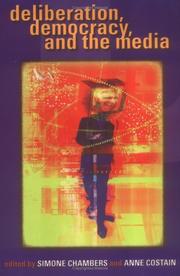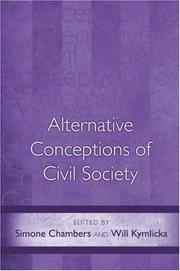| Listing 1 - 10 of 10 |
Sort by
|
Book
ISBN: 0801483301 9780801483301 Year: 1996 Publisher: Ithaca (N.Y.): Cornell university press
Abstract | Keywords | Export | Availability | Bookmark
 Loading...
Loading...Choose an application
- Reference Manager
- EndNote
- RefWorks (Direct export to RefWorks)
Democracy --- Discourse analysis. --- Social aspects. --- Habermas, Jürgen, --- 1 HABERMAS, JÜRGEN --- Filosofie. Psychologie--HABERMAS, JÜRGEN --- Habermas, Jurgen --- -Habŏmasŭ, Wirŭgen --- Habŏmasŭ --- Khabermas, I︠U︡. --- Khabermas, I︠U︡rgen --- Ha-pei-ma-ssu, Yu-erh-ken --- Habeimasi --- הברמאס, יורגן --- יורגן הברמס --- 哈贝马斯 --- Contributions in political science --- -Contributions in political science --- 1 HABERMAS, JÜRGEN Filosofie. Psychologie--HABERMAS, JÜRGEN --- -Habermas, Jürgen --- Discourse analysis --- Discourse grammar --- Text grammar --- Semantics --- Semiotics --- Self-government --- Political science --- Equality --- Representative government and representation --- Republics --- Social aspects --- Habermas, Jürgen. --- Habermas, Jürgen --- Habermas, Jürgen. --- Habermas, Jürgen --- Habŏmasŭ, Wirŭgen --- Democracy - Social aspects. --- Habermas, Jürgen, - 1929 --- -Democracy
Book
ISBN: 131632429X 1316310914 1316327639 1316330974 1316334317 1107499135 1316320936 1316181995 1107101522 1316317595 131629028X 9781316320938 9781316181997 9781107101524 9781107499133 Year: 2015 Publisher: Cambridge Cambridge University Press
Abstract | Keywords | Export | Availability | Bookmark
 Loading...
Loading...Choose an application
- Reference Manager
- EndNote
- RefWorks (Direct export to RefWorks)
Difference, diversity and disagreement are inevitable features of our ethical, social and political landscape. This collection of new essays investigates the ways that various ethical and religious traditions have dealt with intramural dissent; the volume covers nine separate traditions: Confucianism, Buddhism, Christianity, Judaism, Islam, liberalism, Marxism, South Asian religions and natural law. Each chapter lays out the distinctive features, history and challenges of intramural dissent within each tradition, enabling readers to identify similarities and differences between traditions. The book concludes with an Afterword by Michael Walzer, offering a synoptic overview of the challenge of intramural dissent and the responses to that challenge. Committed to dialogue across cultures and traditions, the collection begins that dialogue with the common challenges facing all traditions: how to maintain cohesion and core values in the face of pluralism, and how to do this in a way that is consistent with the internal ethical principles of the traditions.
Conflict management. --- Conflict management--Religious aspects. --- Religions. --- Religions --- Conflict management --- Religion --- Philosophy & Religion --- Religion - General --- Conflict control --- Conflict resolution --- Dispute settlement --- Management of conflict --- Managing conflict --- Management --- Negotiation --- Problem solving --- Social conflict --- Crisis management --- Comparative religion --- Denominations, Religious --- Religion, Comparative --- Religions, Comparative --- Religious denominations --- World religions --- Civilization --- Gods --- Religious aspects --- Religious aspects.
Book
ISBN: 1509543392 9781509543403 9781509543397 1509543406 Year: 2024 Publisher: Cambridge: Polity Press,
Abstract | Keywords | Export | Availability | Bookmark
 Loading...
Loading...Choose an application
- Reference Manager
- EndNote
- RefWorks (Direct export to RefWorks)
Is democracy worth saving? Responding to the erosion of democracy, philosophical debates have pivoted from analyzing the best forms of democracy to questioning what is so valuable about democracy to begin with, how we can save it, and whether it is indeed worth saving. Contemporary Democratic Theory charts this pivot and surveys the most important new developments in the philosophical, theoretical, and normative examination of the concept of democracy. Comparisons that dominated 20th century democratic theory - between direct democracy, participatory democracy, deliberative democracy, and agonistic democracy - are in the 21st century giving way to comparisons between democracy and its challengers: epistocracy, technocracy, meritocracy, oligarchy, and autocracy. Philosophical interest in the canonical figures of democratic theory like Aristotle, Rousseau and Mill is being eclipsed by damage control in the face populism, sinking trust in democratic institutions, failing political parties, and the spread of misinformation. Overarching epochal forces of crisis and threat are pushing democratic theory in new directions and towards new ideas. This refreshing and authoritative text identifies, explains, and evaluates the new directions taken by contemporary democratic theory in challenging times.
Political philosophy. Social philosophy --- Political systems
Book
ISBN: 1501722549 Year: 2018 Publisher: Ithaca, NY : Cornell University Press,
Abstract | Keywords | Export | Availability | Bookmark
 Loading...
Loading...Choose an application
- Reference Manager
- EndNote
- RefWorks (Direct export to RefWorks)
In Reasonable Democracy, Simone Chambers describes, explains, and defends a discursive politics inspired by the work of Jürgen Habermas. In addition to comparing Habermas's ideas with other non-Kantian liberal theories in clear and accessible prose, Chambers develops her own views regarding the role of discourse and its importance within liberal democracies.Beginning with a deceptively simple question-"Why is talking better than fighting?"-Chambers explains how the idea of talking provides a rich and compelling view of morality, rationality, and political stability. She considers talking as a way for people to respect each other as moral agents, as a way to reach reasonable and legitimate solutions to disputes, and as a way to reproduce and strengthen shared understandings. In the course of this argument, she defends modern universalist ethics, communicative rationality, and what she calls a "discursive political culture," a concept that locates the political power of discourse and deliberation not so much in institutions of democratic decision-making as in the type of conversations that go on around these institutions. While discourse and deliberation cannot replace voting, bargaining, or compromise, Chambers argues, it is important to maintain a background moral conversation in which to anchor other activities.As an extended case study, Chambers examines the conversation about language rights that has been taking place for more than twenty years in Quebec. A culture of dialogue, she shows, has proved a positive and powerful force in resolving some of the disagreements between the two linguistic communities there.
Democracy --- Discourse analysis. --- Political Science & Political History. --- Social aspects. --- Habermas, Jürgen.
Book
ISBN: 9781501722547 Year: 2018 Publisher: Ithaca, NY
Abstract | Keywords | Export | Availability | Bookmark
 Loading...
Loading...Choose an application
- Reference Manager
- EndNote
- RefWorks (Direct export to RefWorks)
Digital
ISBN: 9781316181997 Year: 2015 Publisher: Cambridge Cambridge University Press
Abstract | Keywords | Export | Availability | Bookmark
 Loading...
Loading...Choose an application
- Reference Manager
- EndNote
- RefWorks (Direct export to RefWorks)

ISBN: 0847698114 Year: 2000 Publisher: Lanham, Md Rowman & Littlefield
Abstract | Keywords | Export | Availability | Bookmark
 Loading...
Loading...Choose an application
- Reference Manager
- EndNote
- RefWorks (Direct export to RefWorks)
Mass communications --- Political sociology --- Democracy. --- Freedom of speech. --- Freedom of the press. --- Liberty of conscience. --- Mass media --- Political aspects.

ISBN: 0691087962 0691087954 9780691087962 Year: 2002 Publisher: Princeton, N.J. : Princeton University Press,
Abstract | Keywords | Export | Availability | Bookmark
 Loading...
Loading...Choose an application
- Reference Manager
- EndNote
- RefWorks (Direct export to RefWorks)
Political philosophy. Social philosophy --- Ethics --- Social ethics --- Cultural pluralism --- Ethics. --- Social ethics. --- Cultural pluralism. --- Social problems --- Sociology --- Deontology --- Ethics, Primitive --- Ethology --- Moral philosophy --- Morality --- Morals --- Philosophy, Moral --- Science, Moral --- Philosophy --- Values --- Cultural diversity --- Diversity, Cultural --- Diversity, Religious --- Ethnic diversity --- Pluralism (Social sciences) --- Pluralism, Cultural --- Religious diversity --- Culture --- Cultural fusion --- Ethnicity --- Multiculturalism --- Déontologie --- Morale sociale --- Pluralisme culturel --- Déontologie
Book

ISBN: 9780691242804 9780691242811 Year: 2024 Publisher: Princeton : Princeton University Press
Abstract | Keywords | Export | Availability | Bookmark
 Loading...
Loading...Choose an application
- Reference Manager
- EndNote
- RefWorks (Direct export to RefWorks)
The idea that democratic governance rests on active self-rule by citizens plays surprisingly little part in current theories of democracy, which instead stress the importance of representation by elected, appointed, or randomly selected bodies such as legislatures, courts, and juries. This would have astonished eighteenth-century theorists of democracy, who viewed universal suffrage and majoritarian voting as the sole criteria for democratic politics. Active and Passive Citizens defends the view of these earlier thinkers, asserting that individual agency is the very essence of democracy. In this provocative and lucidly argued book, Richard Tuck draws on the distinction made by the Abbé Sieyès, a leading political theorist of the French Revolution, between “active” citizens (the electorate) and “passive” ones (those who are represented by the institutions of the state). Tuck traces our current representative view of democracy to Sieyès and contrasts him with Rousseau, a theorist of active self-rule by the people. Tuck argues that modern theories of democracy have effectively turned us into passive citizens and calls for a renewal of a majoritarian democracy that realizes the full potential of active citizenship. Based on the prestigious Tanner Lectures delivered at Princeton University’s Center for Human Values, Active and Passive Citizens is edited and introduced by Stephen Macedo and includes commentary by political theorists Simone Chambers, Joshua Cohen, John Ferejohn, and Melissa Schwartzberg.
Political participation --- Political science --- Representative government and representation --- Voting --- Philosophy
Book

ISBN: 9780691220130 Year: 2020 Publisher: Princeton, NJ
Abstract | Keywords | Export | Availability | Bookmark
 Loading...
Loading...Choose an application
- Reference Manager
- EndNote
- RefWorks (Direct export to RefWorks)
| Listing 1 - 10 of 10 |
Sort by
|

 Search
Search Feedback
Feedback About UniCat
About UniCat  Help
Help News
News